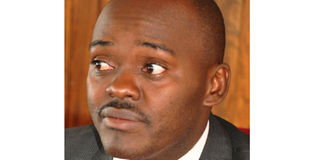Scrap positions of army MPs, RDCs - Opposition

Busiro East MP. Mr Medard Ssegona
What you need to know:
Currently, there are 10 UPDF representatives in the 10th Parliament, including Gen Katumba Wamala, Brig Innocent Oula, Gen Elly Tumwine, Capt Suzan Lakot and Capt Evelyn Asiimwe.
Opposition leaders are demanding that the 10 slots for Uganda People’s Defence Forces (UPDF) representatives in Parliament be scrapped to enable the institution exercise impartiality.
Currently, there are 10 UPDF representatives in the 10th Parliament, including Gen Katumba Wamala, Brig Innocent Oula, Gen Elly Tumwine, Capt Suzan Lakot and Capt Evelyn Asiimwe.
Others are Col Felix Kulayigye, Maj Gen Pecos Kutesa, Col Francis Takirwa, Lt Col Flavia Byekwaso and Lt Gen Ivan Koreta.
The leaders drawn from different political parties on Tuesday held a consultative meeting for the Constitutional Amendment Bill (2019) in Jinja organised by Opposition MPs led by Busiro East MP Medard Lubega Ssegona.
Mr Saulo Nsongambi, from the Democratic Party (DP), said: “Army representatives [in Parliament] work on orders, so they can’t be impartial when deliberating on issues of public interest.”
Mr Kirunda Mukama, a member of Forum for Democratic Change [FDC], said: “They don’t subscribe to any political party, not even to Independents; so they can’t be non-partisan. To remain impartial, they should stay out of Parliament like prisons and police officers.”
The DP chairperson for Jinja West Constituency, Mr Robert Tenywa, said since the army is represented by the Minister for Defence and his two assistants, there is no need for them to stay in Parliament.
“The army has the ability to understand what is happening in Parliament and there is no need for them to stay there under the guise of getting assimilated into civilian matters,” he urged.
Mr Ssegona said the army has been partisan throughout the time it has spent in Parliament.
“During the passing of the Age Limit Bill, they [UPDF] were on the government side; one of the soldiers moved out lamenting that he had done the wrong thing because he feared to lose his job.”
“Most of them left their brains in the barracks, especially when debating issues of politics. The army’s stay in Parliament does not guarantee peace and security because during the age limit debate, they were beaten up by their juniors,” he added.
The leaders also want the office of the Resident District Commissioner [RDC] abolished, saying their operations are wastage of taxpayers’ money.
Ms Fatuma Namukose from Justice Forum (JEEMA), said: “RDCs are ‘political rejects’ and their offices are duplicating work because what they do can be performed by other leaders like the Chief Administrative Officers (CAOs), district chairpersons and district intelligence officers.”
The office of the RDC was created at a time when the traditional public administration structures had broken down. Soon after the National Resistance Army [NRA] took power in 1986, the President appointed Special District Administrators (SDA) to run the affairs of the district.
However, even after the decentralised system of governance came into force, SDAs were retained but their titles constitutionally changed to RDCs.
The leaders proposed that presidential term limits should be restored and the two-term limit applied across all political offices.
The meeting also proposed that the Judicial Service Commission should be involved in the appointment of members of the Electoral Commission.
Other issues proposed include; scrapping of appointment of ministers from among Members of Parliament, restricting ministers and state ministers to 21 and the scrapping of the Office of the Prime Minister.
The MPs, who among others, included Bugiri Municipality MP Asuman Basalirwa and Apac Municipality MP Patrick Ochan, started their consultations from Busoga, before proceeding to Tororo (Bukedi region), Mbale (Bugisu) and Soroti district (Teso region).


